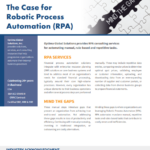Optima Global Solutions provides RPA consulting services for automating manual, rule-based and repetitive tasks.
The Case for Robotic Process Automation (RPA)
RPA Services
Financial process automation solutions integrate with enterprise resource planning (ERP) solutions or core business systems and tend to address most of an organization’s needs for standard financial processing, typically around their core high-volume processes. However, every organization has unique elements to their business operations and often several process steps are performed manually. These may include repetitive data entries, comparing vendor prices to determine optimal spot prices, validating employee or customer information, uploading and downloading data from an ever-expanding number of supplier and customer portals, or collecting data from diverse business groups to prepare financial statements.

Mind the Gaps
These manual steps introduce gaps that prevent an organization from achieving true end-to-end automation. Not addressing these gaps results in loss of productivity and efficiency. Continuing with manual processing, investing in traditional integration, or outsourcing are costly alternatives.
Minding these gaps is where organizations are leveraging Robotic Process Automation (RPA). RPA automates mundane manual, repetitive tasks and rules-based tasks that contribute to costly errors and inefficiencies.
RPA Benefits
- Frees staff from tedious-low-value tasks, making them available for higher-value creative work
- Dramatically reduces errors and assures consistency
- Can be rapidly developed (low code), deployed, and maintained
- Does not require changes to applications
- Supports any development or deployment environment
- Unlike heavy business logic, solutions can be easily modified to accommodate business requirements
- Can be integrated with AI and ML tools to optimize processes
- Available stand alone or fully integrated with the Kofax Intelligent Automation platform for delivering true digital transformation
Case Examples
- Supplier and customer onboarding: validating credit and personnel data
- Portal queries: extracting content
- Price comparisons: routinely checking multiple sources for the best prices
- Market intelligence: collecting data to support research
- Reconciliation: comparing account balances of separate records
- Updating systems: from Excel or other data sources
- Supporting financial close: gathering journal entry data
- Linking to external systems: that cannot be connected to through other IT options

